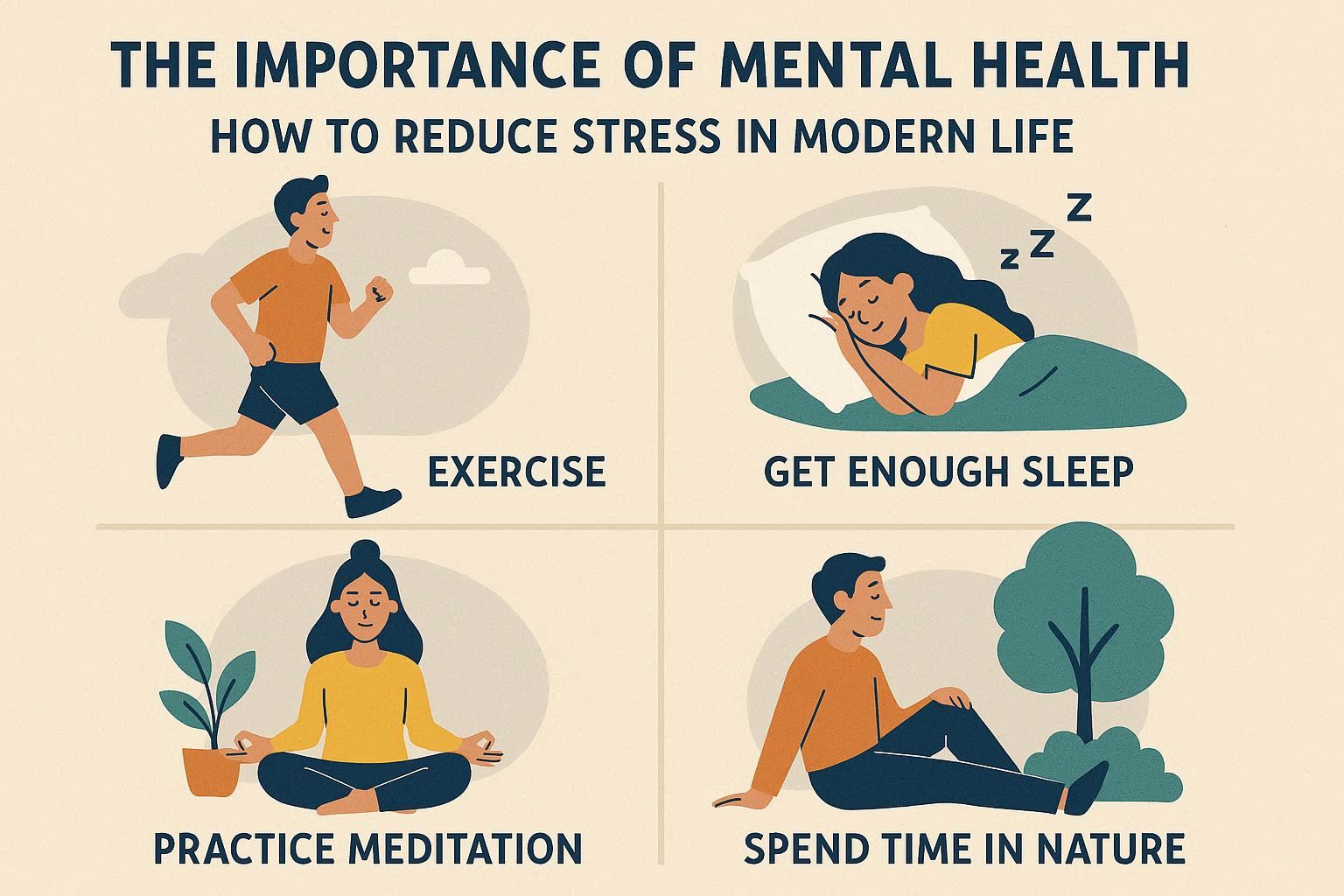Mental health has become one of the most discussed topics in recent years, and in 2025 its importance is greater than ever. Modern life is full of opportunities, but it also brings challenges such as constant connectivity, work pressure, and economic uncertainty. These factors can increase stress and affect mental well-being. Taking care of mental health is not a luxury—it is a necessity for a productive and fulfilling life.
This article explains why mental health matters, explores the causes of stress, and provides practical strategies to reduce stress and improve emotional well-being in the modern world.
1. Why Mental Health Matters
Mental health is more than the absence of illness—it is a state of emotional balance, clarity, and resilience. Good mental health allows people to handle daily challenges, build strong relationships, and stay productive at work. Without it, even the simplest tasks can feel overwhelming. According to global health organizations, mental health is a key factor in overall well-being, and neglecting it can increase risks for physical illnesses like heart disease, high blood pressure, and weakened immunity.
2. Common Causes of Stress in Modern Life
Stress is a natural response to demanding situations, but chronic stress can be harmful. In today’s world, some of the most common causes of stress include:
- Work Pressure – Long hours, tight deadlines, and job insecurity.
- Financial Worries – Rising living costs and economic uncertainty.
- Digital Overload – Constant notifications and screen time reduce focus and increase anxiety.
- Social Expectations – Pressure to achieve success, maintain appearances, and meet social standards.
- Global Issues – News of climate change, conflicts, and global health concerns contribute to background stress.
Understanding these triggers is the first step in learning how to manage them effectively.
3. The Connection Between Stress and Health
Stress is not just “in the mind”—it affects the entire body. Chronic stress releases hormones like cortisol, which can cause headaches, digestive problems, sleep disorders, and even weaken the immune system. Mentally, stress increases irritability, reduces concentration, and can lead to anxiety or depression. Recognizing stress as a whole-body issue highlights the importance of taking it seriously and addressing it early.
4. Practical Strategies to Reduce Stress
Fortunately, there are proven ways to reduce stress and improve mental health. Some of the most effective strategies include:
- Mindfulness and Meditation – Daily mindfulness practices help calm the mind, reduce anxiety, and increase focus.
- Exercise – Physical activity releases endorphins, the body’s natural mood boosters.
- Healthy Diet – Nutritious meals support brain function and stabilize mood.
- Time Management – Planning tasks and prioritizing reduces the feeling of being overwhelmed.
- Relaxation Techniques – Deep breathing, yoga, or listening to calming music can help restore balance.
5. The Role of Social Connections
Humans are social beings, and strong connections are essential for mental health. Spending time with supportive friends and family reduces loneliness and provides emotional strength. In 2025, digital platforms make it easier to stay in touch, but face-to-face interactions remain more powerful in building true connections. Even short conversations or group activities can have a positive impact on emotional well-being.
6. Digital Detox: Balancing Online and Offline Life
One of the modern challenges to mental health is digital overload. While technology connects people, it also creates constant pressure to stay updated and available. A digital detox—reducing screen time, limiting social media, and creating “tech-free” zones—can significantly lower stress. Many people now practice scheduled breaks from devices to restore balance between online and offline life.
7. Work-Life Balance in 2025
For many, work is a major source of stress. Remote and hybrid work models have changed the way people manage professional and personal responsibilities. Setting clear boundaries—such as fixed work hours, regular breaks, and dedicated personal time—helps prevent burnout. Employers also play a role by encouraging flexible schedules, mental health days, and supportive work cultures.
8. Professional Help and Therapy
Sometimes, managing stress alone is not enough. Speaking with a professional therapist or counselor can provide valuable tools for coping. Therapy is not a sign of weakness—it is a step toward empowerment and self-improvement. In 2025, online therapy platforms make mental health support more accessible and affordable than ever.
9. Daily Habits for Better Mental Health
Small daily actions can build resilience and prevent stress from taking over. Examples include:
- Getting regular physical activity.
- Practicing gratitude through journaling.
- Spending time outdoors in nature.
- Setting realistic goals and expectations.
- Prioritizing rest and good sleep habits.
These habits may seem simple, but their long-term impact on mental health is powerful.
Conclusion
In today’s fast-paced world, mental health is just as important as physical health. Stress is an unavoidable part of life, but learning to manage it is key to well-being. By practicing mindfulness, building social connections, balancing digital life, and seeking help when needed, anyone can reduce stress and improve their quality of life. Remember, mental health is not a destination—it is a daily journey of self-care, balance, and resilience.

